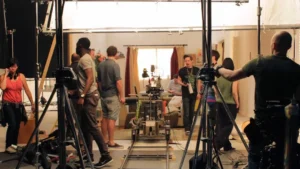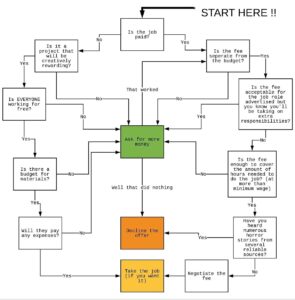I want to share a personal story from working in theatre and how it taught me to stand up for myself.
A few years ago I worked on a show (never mind when or what) as a head of department in wardrobe. It was my first job in this role but I had a lot of experience working in theatre and making, so I knew I would be able to do the job. The only thing I hadn’t been prepared for was managing a team (or person individually) who didn’t want to be there or respect my authority. I had never worked with someone who thought I didn’t have the right to be there and that I wasn’t qualified for the job.
At the time I was 24, young for a HOD but not unheard of in a short run piece. My assistant was a swing tech at the venue who was a few years my senior, liked by everyone there and not willing to take shit from anyone which I respected (and still do actually). We got on relatively well at first but after a while I realised she would do her own thing without consulting me; she would turn up at a time that suited her or take on projects that weren’t the priority. I thought she was trying to be helpful but it undermined me and I didn’t realise until it was too late. The problem was that I wanted her to be my friend, I didn’t know anyone in the town and I had always assumed that you work better with people you like – but this is not strictly true. I have worked for plenty of people I don’t like since then but the key is that I respected them. Sadly, I didn’t know this at the time and tried to keep her sweet. I would pander to her will and not speak up in case she got cross with me.
One time she was using the overlocker, and as she wasn’t a regular maker, I made a suggestion of a better way of doing it. She told me I was being patronising and that no one liked me. The problem with being worn down slowly is that you don’t notice it’s happening until it’s far too late and you end up believing it with very little effort. At the end of the run I explained to her the way I wanted to do the get out. She refused to listen so it ended up taking far longer than it should have done.
I think the main problem I had with this was that I didn’t know if I could turn to anyone. Hierarchy-wise I was hired by the theatre company and she was hired by the venue so I didn’t know who to talk to. But more than that I assumed I would be seen as weak to not be able to deal with her on my own so I suffered in silence which made the whole thing worse. I should have gone straight to the company manager (who I know would have listened) and told her my concerns or to BECTU to ask their advice. If that didn’t work I should have rung the company and asked them to sort it out. Failing all else, to be honest I think I should have left. I always believed that you see a job out to the end but I was really unhappy and I continued to put myself through it based on loyalty to a company I didn’t owe much to.
At the end of the job I emailed the company, simply explaining what had happened and that I wouldn’t be coming back to work for the company again if the situation stayed the same. They told me they had no idea this had happened and that they understood. They didn’t employ me again.
I used to let myself believe that things didn’t bother me, I would tell myself it was ok and that I had thicker skin but then when it finally did hit me it hit all at once and I felt it was too late to get angry. I would see the weeks of abuse and think ‘well, I should have said something earlier’ and then I would continue to not say anything.
Here is how I would deal with it now;
I should have said from the off what I expected her to do, the hours I wanted her to work and the role I wanted her to fill. At this point, there would have been strict guidelines for us both to follow. If either of us didn’t fulfil our tasks we’d both know and be able to discuss it. But also it would be easier to discuss to other people. I should have also told someone the first time she shouted in my face. It isn’t weakness to deal with this but it is weak not to tell anyone about it. I was embarrassed when she should have been, and by taking on that embarrassment for myself I let her have the power. You should never be afraid to stand up for yourself. And it’s alright to tell someone you need help. I should have stood my ground more, when I wanted something done one way I should have enforced it. So, my message from this article is “stand your ground’.
It helps to be liked, it really does, but some people aren’t going to like you, and you aren’t going to like them – and you have to accept that.
As long as you are good at your job, civil and get the work done to the best of your ability, that’s what matters. This industry is small and people talk, but believe me, they talk way more about whether you are competent than if they like you.







